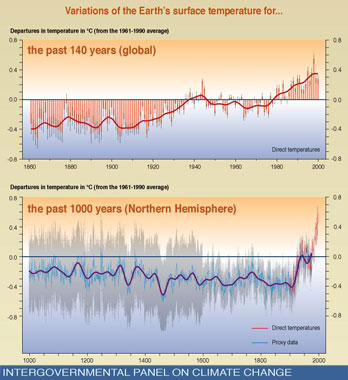As 192 countries meet in Copenhagen to wrangle out a complex and at times sticky agreement to combat climate change, the World Meteorological Organization (WMO) has released new evidence that the world is undergoing warming. According to the WMO the current decade is likely the warmest on record.
“The decade of the 2000s (2000–2009) was warmer than the decade spanning the 1990s (1990–1999), which in turn was warmer than the 1980s (1980–1989),” the press release states.
Global average temperatures have been rising for 150 years (when the first dependable temperature measurements were taken) with the warming trend has increasing since the 1970s.
 Intergovernmental Panel on Climate Change (IPCC) graph showing that surface temperatures for the past 140 years (global) and the past 1000 years (Northern Hemisphere). |
While 1998 is still considered the warmest year on record, researchers say that preliminary data shows 2009 will likely be the fifth warmest. The analysis also shows that while the US and Canada experienced cooler than average temperature this year, temperatures in Southeast Asia and Africa could be the warmest yet.
Warmer temperature exacerbated drought conditions across the world. According to WMO, China experienced its worst drought in five decades. Drought in East Africa killed tens of thousands of livestock, while a poor monsoon season hit India’s agriculture hard. A crippling drought in Australia also continued unabated this year.
Temperature data is collected from climate and weather stations around the world, ships and buoys on the sea, and satellites.
Related articles
Global warming will increase likelihood of civil war in Africa by 55 percent
(11/23/2009) There have been many warnings by policymakers that rising temperatures in Africa could lead to civil conflict, however a new study in Proceedings of the National Academy of Sciences is the first to uncover empirical evidence for these warnings and quantify them. The results—that higher temperatures increased the likelihood of civil war in sub-Saharan Africa by over 50 percent—took aback even the researchers.
Sea levels set to rise as Arctic warming replaces millennia long natural cooling cycle

(09/03/2009) According to a new study published in Science the Arctic should be cooling, and in fact has been cooling for millennia. But beginning in 1900 Arctic summer temperatures began rising until the mid-1990s when the cooling trend was completely overcome. Researchers fear that this sudden up-tick in temperatures could lead to rising sea levels threatening coastal cities and islands. “Scientists have known for a while that the current period of warming was preceded by a long-term cooling trend,” said lead author Darrell Kaufman of Northern Arizona University. “But our reconstruction quantifies the cooling with greater certainty than ever before.”
Global warming estimates double in severity according to new MIT modeling
(05/20/2009) Employing the MIT Integrated Global System Model, scientists have found that global warming could be more than twice as severe as previous estimates six years ago. The MIT Integrated Global Systems Model, which uses computer simulations to analyze the relationship between climatic changes and the global economy, found during 400 runs of the model that there is a 90 percent probability that temperatures will have risen 3.5 to 7.4 degrees Celsius by the end of the century.